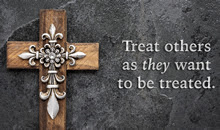 From the Lewis Center for Church Leadership of Wesley Theological Seminary
From the Lewis Center for Church Leadership of Wesley Theological SeminaryDouglas Brouwer, author of How to Become a Multicultural Church, says in diverse settings it's not enough to treat people the way you would like to be treated. It's important to learn how they want to be treated.
Doesn’t it make sense to treat others as you would like to be treated? It sounds right, and of course, it’s biblical. But does it tell us enough about how to respond to cultural diversity within congregations? I believe the answer is no.
What does respect look like?
Let me ask you something I had not thought to ask myself before serving a multicultural congregation. What does respect look like? I want to be treated with respect, of course, and I imagine that everyone else does as well, but I now see that respect has different meanings, sometimes vastly different meanings, in different cultures. Having respect for someone might mean saying hello in the morning, or it might mean leaving that someone alone, depending on the culture. Having respect might mean making eye contact, or it might mean refraining from eye contact, once again depending on the culture. Having respect might mean being direct and blunt whenever a question is asked, or it might mean an overabundance of politeness. Again, it depends on the culture.
One variation on the Golden Rule is sometimes referred to as the Platinum Rule: “Treat others as they want to be treated.” In a multicultural situation, I think this is the rule we need to embrace.
The Platinum RuleOne variation on the Golden Rule is sometimes referred to as the Platinum Rule: “Treat others as they want to be treated.” In a multicultural situation, I think this is the rule we need to embrace.
It is difficult and sometimes painstaking work, however, to figure out how others want to be treated. And knowing exactly how another human being would like to be treated in every situation might well be impossible (as any married person will acknowledge). But making the effort to understand how another wants to be treated will at least change the frame of reference from “how I want to be treated is probably how all other people want to be treated” or “how a person from one culture wants to be treated is more than likely how a person from another culture wants to be treated.”
Key Questions for Leaders in Diverse SettingsI had no idea until recently that major corporations and larger businesses have begun to devote a great deal of time to this issue — often under the not very pastoral sounding term “diversity management.” The idea, greatly oversimplified, is that a leader needs to understand the people she is leading in order to have the most effective relationships.
Here are some questions that business leaders in multicultural settings are having to ask themselves, and these questions are useful for pastors and church leaders in multicultural churches as well:
- Do you test your assumptions before acting on them? Believe there is only one right way of doing things, or that there might be a number of valid ways to accomplish the same goal?
- Do you have honest relationships with each staff member you supervise? Are you comfortable with each of them? Do you know what motivates them, what their goals are, how they like to be recognized?
- Are you able to give negative feedback to someone who is culturally different from you?
- Do you rigorously examine your team’s (or church’s) existing polices, practices, and procedures to ensure that they do not differently impact different groups? When they do, do you change them?
- Do you take immediate action with people you supervise when they behave in ways that show disrespect for others in the workplace, such as inappropriate jokes and offensive terms?
This article is excerpted from How to Become a Multicultural Church (Wm. B. Eerdmans Publishing Company, 2017) by Douglas J. Brouwer. Used by permission. The book is available at Cokesbury and Amazon.
Related Resources:
- The Qualities of Competent Intercultural Leadership by Brian Leander
- Building Multicultural Relationships by Mark DeYmaz And Bob Whitesel
- Multicultural Fluency and the Discipline of Dialogue by Curtiss Paul DeYoung
 Worship and Mission Should Go Hand in Hand by Mark R. Teasdale
Worship and Mission Should Go Hand in Hand by Mark R. Teasdale Evangelism Professor Mark Teasdale says that an essential function of worship is to undergird a congregation's missional identity. In worship, God consecrates us to carry forth God's holiness as we serve in God's mission of making disciples.
Worship and mission go hand in hand, each supporting each other. Worship is essential if we are to be missional.
I confess that I have not always seen worship as so important. I thought worship was boring when I was a kid (and as an adult I don’t always have a better opinion of it!) This is because worship is so often disconnected from mission. Aside from a possible announcement about mission activities the congregation supports, worship is often treated as the opposite of going into mission. It is more a consumer activity. A worship service is something someone else does for you, like a full-service gas station where the attendants pump your gas and clean your windows. Likewise, many of us experience worship as a service performed by professionals who pray, read the Bible, and sing praises for us. We do not know it as an invitation into the presence of God and God’s mission.
Every time we gather to worship we should come prepared to be consecrated for our ongoing preparation in God’s mission.
Congregations that fret over whether their worship service is seeker-friendly or contemporary enough miss the point. If worship is not more than a service, and if a service is just something professionals provide for people, then people will find worship lacking regardless of its style. This may not happen right away if a congregation has high production values for their worship services, but if the primary work people are asked to do in worship is simply to consume the service, a congregation will need to make their services bigger, better, and more exciting to keep people coming. This is the opposite of the call of God for congregations to be missional. Consumer logic and missional logic do not mix.The primary reason that worship becomes unhinged from mission is because congregations forget that God is present when God’s people worship. Jesus make it clear that God shows up every time disciples are together: “For where two or three are gathered in my name, I am there among them” (Matthew 18:20). This includes worship. When we ignore God’s active presence, worship becomes just a repetition of rituals and words that have little connection to the outside worlds. This makes it easy to segment worship away as a chore we do once a week rather that to see it as something that influences how we live.
If God is with us when we worship, that should change everything. Our worship opens the door for us to enter God’s holiness as a congregation. We praise God together for that holiness, and we allow God to consecrate us to be carriers of that holiness as we serve in God’s mission of making disciples. Jesus consecrates us for the holy work of mission when we gather in his presence. Baptism, commissioning, and ordination are unique moments when we as a people of God acknowledge and celebrate God’s consecrating power for specific individuals or for specific acts of worship.
All of us can seek and celebrate God’s consecration during our regular times of worship. This is important because consecration is not a one-time event. We sometimes need to be re-consecrated. God understands this.
Remember, the Great Commission in Matthew tells us to serve as witness “as we are going” throughout our daily lives. The missional tactic of being consecrated regularly through worship is important for us to avoid losing our focus on carrying God’s holy gift of discipleship to others. Every time we gather to worship we should come prepared to be consecrated for our ongoing preparation in God’s mission.
This article is excerpted from Go! How to Become a Great Commission Church (General Board of Higher Education and Ministry, 2017) by Mark Teasdale. Used by permission. The book is available at Cokesbury and Amazon.
Related Resources:
- Revitalizing Worship is More than a Question of Style by Donna Claycomb Sokol And L. Roger Owens
- Missional Church: More than a Catchphrase by Doug Powe
- Worship Game Changers by Thomas G. Bandy and Lucinda S. Holmes
The Right Question:
Leaders do not need answers. Leaders must have the right questions.
Rick Rusaw and Brian Mavis encourage the concept of being a "neighboring church" by asking their church members these questions about their nearest neighbors:
- How many names do you know?
- Do you know something about each of them?
- Can you tell some hurt or hope or dream they have?
 Learn to Welcome and Engage New People
Learn to Welcome and Engage New PeopleLearn concepts and strategies to welcome and respond to your first-time and repeat visitors, reach younger generations, expand your church's entry points, and get new people involved. The New Welcome Video Tool Kit helps you open your church to new people by acknowledging the changing ways that people enter into the life of congregations.
Learn more and watch introductory videos now.
 Unclutter Your Church
Unclutter Your ChurchRevitalizing congregations must strip away some of the vestiges of the past to make space for the new amidst decades of physical and emotional clutter. "To the Point: Unclutter Your Church Now" helps congregations unshackle from the weight of clutter and disorganization.
---
What needs to die in your church? We begin the journey of restarting your church by allowing for, even encouraging, places of death. We choose to have a memorial service for what worked in the past, to honor the prior period of time, and to make a decision to move forward. We choose to let the past set us free to fly, instead of letting the past become a shackle that chains us to a certain way of doing things.
Look around you with fresh eyes, and you will see obvious signs of the past still trying to shackle life in your church. The first thing I see in reStart churches is clutter. Enormous amounts of clutter and disorganization. Clutter that looks like hoarding.
In my current church, we spent my first year clearing out massive amounts of clutter. One day early in my tenure I walked into the nursery where the children are cared for during Sunday morning, and there was an aisle to walk through that led to a station with toys in the back of the room.
The first thing I saw when I stepped into the room was a big sign that read “Do Not Come in Here without an adult!” I understood the sign because the area really was a danger zone. The “aisle” was actually a little path that cut through tall stacks of equipment, papers, toys, boxes, books, and papers. There was so much stuff crammed into the room that it was massively depressing.
As we began cleaning out the nursery, we found old vacation Bible school papers from four decades prior. While they were fascinating to see in a memorabilia sort of way, they weren’t doing any good stacked in boxes and cluttered piles in the nursery.
As we began throwing this stuff away, there was a lot of pain around letting it go. The people worried that they might need that curriculum, since it was expensive to buy new VBS materials. They thought perhaps we needed to store it somewhere, just in case it might be needed.
They groaned, grieved, held tight, and fought as we all pried our fingers off the stuff of our history.
Some churches may not have literal clutter but rather institutional or habitual clutter. “We’ve always done it this way” is a common statement about clutter. “I can’t worship without my hymn … my cross … my pew” are declarations of a cluttered soul.
The only One we worship is God. We don’t worship our stuff, our memories, our dreams, our dashed hopes, or our traditions. We worship our God. We worship the One who knows how to raise up a king from a person who starts out hiding among the baggage.
There is hope for us. We may have surrounded ourselves with things that were once comforting and are now binding, but God still can choose us to lead the way forward. There’s hope for clutter-dwellers, hoarders, and memory-storers. There’s hope for the fearful ones who hold on with clenched hands. There’s hope because God can make a way.
Remember the words of remembrance called the Shema, which centered the people of Israel: “Israel, listen! Our God is the Lord! Only the LORD! Love the LORD your God with all your heart, all your being, and all your strength” (Deuteronomy 6:4-5).
The people were first admonished, encouraged to hear, to open up their ears to receive the sounds of the message. And the message was one of great love. Love God fully and wholly and completely. Love God with great strength.
But instead, when we describe our churches, we speak out words that show the soul’s depressed state. These words are sounds of hopelessness. We come at people, including ourselves, reminding everyone of our faults, as if we have no recognition of the beauty among us. I have done this.
But faith requires hearing, and hearing requires faith in God. When we speak, what story do we tell ourselves, and others? Is it the story of our failings, or the story of how God met us in our failure and showed something new and beautiful among us?
What is your church beautiful at? Does it sound beautiful when it sings? Is it beautiful in community? Is it a beautiful place for mission? What is your church’s beauty, and how can you shout out the good, while changing the not-so-good?
This article is by Dottie Escobedo-Frank, a United Methodist pastor. It is adapted from reStart Your Church (Abingdon Press, 2012) and appeared in Leading Ideas January 16, 2014. Used by permission.
Read now and download free.
Quotable Leadership: God is a powerful ally when you are daring to challenge the church to break with the pattern of centuries. (Penny Jamieson)
Adult Education Study: Women Speak of God
From the earliest days of the church, women have spoken and written of their faith. This eight-session study introduces us to the voices of six women who struggled with issues of identity, character, and calling, and who were able to attest to God's living presence amidst their struggles. Women Speak of God is a mid-level course for both women and men and is ideal for your congregation's small groups, adult Bible studies, and Sunday School classes.
Learn more now.
From the earliest days of the church, women have spoken and written of their faith. This eight-session study introduces us to the voices of six women who struggled with issues of identity, character, and calling, and who were able to attest to God's living presence amidst their struggles. Women Speak of God is a mid-level course for both women and men and is ideal for your congregation's small groups, adult Bible studies, and Sunday School classes.
Learn more now.
 Apply Today for Doctor of Ministry in Church Leadership at WesleyWesley Theological Seminary and the Lewis Center together offer a Doctor of Ministry in Church Leadership Excellence. With this track, clergy will receive the enhanced knowledge, skills, and motivation to increase congregational and denominational service, vitality, and growth. The next cohort begins in May 2018 in Washington, DC.
Apply Today for Doctor of Ministry in Church Leadership at WesleyWesley Theological Seminary and the Lewis Center together offer a Doctor of Ministry in Church Leadership Excellence. With this track, clergy will receive the enhanced knowledge, skills, and motivation to increase congregational and denominational service, vitality, and growth. The next cohort begins in May 2018 in Washington, DC.Learn more and apply today.
---
Editor: Dr. Ann A. Michel
Copyright © 2004-2017 Lewis Center for Church Leadership of Wesley Theological Seminary
churchleadership.com/leadingideas
Connect with the Lewis Center:


Lewis Center for Church Leadership
Wesley Theological Seminary
4500 Massachusetts Avenue North West
Washington, D.C. 20016, United States
Copyright © 2004-2017 Lewis Center for Church Leadership of Wesley Theological Seminary
churchleadership.com/leadingideas
Connect with the Lewis Center:


Lewis Center for Church Leadership
Wesley Theological Seminary
4500 Massachusetts Avenue North West
Washington, D.C. 20016, United States
-------


No comments:
Post a Comment